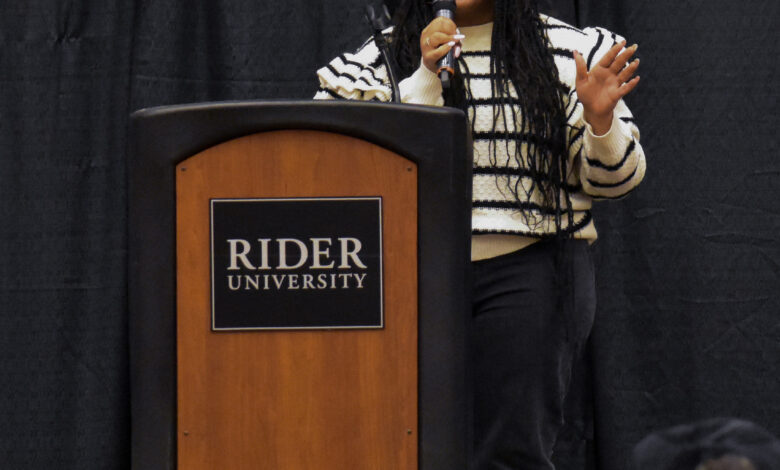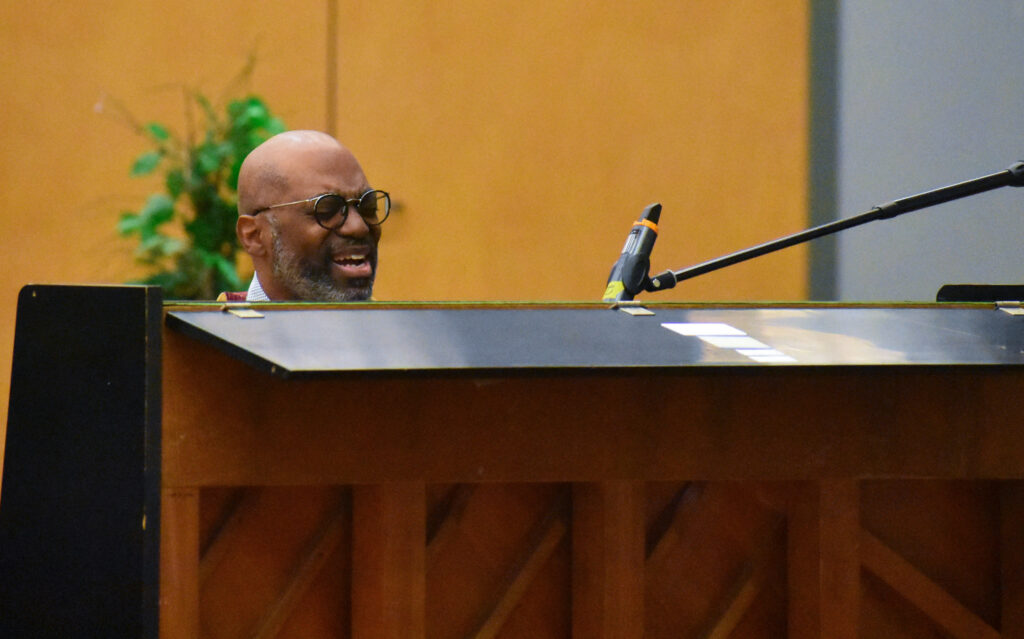
Black spirituality celebrated with music
By Jay Roberson
“Gospel Fest” returned with grace as the community was brought together by song, dance and spirituality at the annual celebration that closes out Black History Month at Rider.
Rider’s Chief Diversity Officer Heeyoung Kim opened up the event by defining gospel: “Gospel means a good story or good news. So I’m confident that we’re not going to let you down.”
Kim introduced the MC for the night, senior political science major and Student Government Association President Naa’san Carr.
Carr, who is also the president of Rider’s NAACP, led the attendees in prayer before moving into the song “Lift Every Voice and Sing,” better known as the “Black National Anthem,” originally written as a poem by NAACP leader James Weldon Johnson in 1900.
Freshman psychology major Aquila Kipp, who uses they/them pronouns, expressed their appreciation for events like these at Rider.
Kipp said, “I’m from Brooklyn, New York, so this is just what we do. My family hasn’t been going to church as much, but that’s why this feels at home.”
‘A lot of love’
Between each song, Center for Diversity and Inclusion student workers and leaders of Black organizations on campus presented information on Black history.
The chief of staff of the CDI, Jada Waddell, gave a brief history lesson on African American art and its wide-felt impact.
“Artistic and cultural movements such as the New Negro, Black arts, Black renaissance, hip-hop and afrofuturism have been led by people of African descent and set the standards for popular trends around the world,” said Waddell.
Keyonia Proctor, a local community member, took the stage to sing “The Windows of Heaven,” which lifted the audience to its feet to join her in singing.
Freshman psychology major Melody Juno admired the welcoming environment the event created for the Rider community.
“There’s just a lot of love that people are showing. It just felt like a really nice environment,” said Juno.
Rider Black Student Union President Kayla McIntyre spoke about how spirituality is rooted in many Black Americans’ lives.
“Belief in God, regular prayer, worship attendance and belief in life after death are some of the core beliefs of a large majority of African Americans,” said McIntyre. “Enslaved Africans were exposed to the literature of the Christian Bible and they found comfort and direction in the same book that was used to justify their enslavement.”
Maranda Curtis, a member of the local community, brought a different display to Gospel Fest and performed a flag dance to “The Lord’s Song.”

Gospel’s origins
The president of Rider’s chapter of Black Men Unified, Shawnaeja DeWitt, educated the audience on the origins of gospel music, which was once rejected but is widely celebrated today.
“Singers like Aretha Franklin had introduced gospel style songs to the pop charts with songs like ‘Think’ in 1968,” said Dewitt. “Church-centric gospel music began to cross over into the mainstream following the release in 1969 recording of ‘Oh Happy Day’ by The Edwin Hawkins Singers.”
Samuel Frisby, who performed at last year’s “Gospel Fest,” returned this year and sang “More Than Anything” by Lamar Campbell and “How Great is Our God” by Chris Tomlin accompanied by the piano.
To close out the night he gave a rousing performance of “Total Praise” by Richard Smallwood which moved the audience to join along in song.
Kipp explained the ending stood out to them and said, “My mom used to be in a choir and they used to sing this song. It really brought me back to that, it was a really odd experience. It felt like a time machine, it was awesome,” said Kipp.
“Gospel Fest” not only served as a way for the community to get together and rejoice in song, but also as a Black history lesson to send off Black History Month at Rider.


